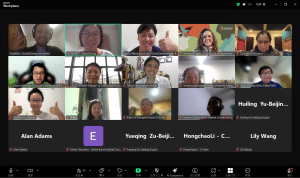How can social organizations (a local term for NGOs) be helped to develop themselves and carry out governance work in vulnerable communities? One example from Shuixinting (SXT) subdistrict in the city of Huangshan, Anhui Province, provides some answers.
SXT subdistrict is a typical area located in the old city. There are 64 residential communities, 6,017 households, and a total of 12,799 residents, most of whom are elderly people in need of care.
There are two major problems plaguing local community governance: public services are insufficient, and residents’ participation in community affairs is low.
After learning from many successful experiences in developed areas such as Beijing, Shanghai and Guangzhou, the SXT subdistrict decided to introduce social organizations to help solve some of these issues.
Since 2019, the government and Party committee of the local subdistrict began to work with the Sunshine Social Work Development Center (SSWDC) to help develop local social organizations.
This attempt lived up to expectations and has seen achieved significant results over the past three years: a total of eight community-based social organizations were successfully established and played an important role in promoting residents’ participation and providing assistance to disadvantaged groups.
The following are seven key actions SSWDC took to help the development of the organizations
-Built a platform to identify needs:
The social workers from SSWDC conducted household surveys in the community, distributed questionnaires, and organized multiple residents’ meetings.
-The organization quickly settled on using “happiness” as a theme to attract community participation, and to establish two community social organizations:
The Happy Neighborhood Dispute Mediation Group and the Happy Art Troupe.
-Invited local people to form a workforce:
Through interviews, the social workers got to meet some prestigious elders in the community, whose support would be vital to the successful mediation of various neighborhood disputes.
These elders were invited to join the Happy Neighborhood Dispute Mediation Group that was being established. Most of them were reluctant at first and unwilling to get involved in disputes between other neighbors in the community.
Through the successful mediation of several pilot cases, the elders involved gained a sense of accomplishment, and were gradually willing to make more contributions to community mediation work.
The establishment of the Happy Art Troupe was not initially welcomed by residents, so the social workers visited people at home, invited them to participate, and eventually created an art troupe consisting of music, drama and dance teams.
-Drafted articles of association for the organization:
Once the members were organized, social workers quickly arranged for everyone to discuss and sign the organization’s regulations, as well as the articles of association.
-Provided high quality and efficient services to residents:
The establishment of a community organization includes a number of different positions. It takes time for relevant personnel to arrive. SSWDC did not wait until all staff had arrived before starting work. Instead, they formed a team and started carrying out activities at the same time, with more people then deciding to join once they had seen some of the activities.
-Facilitated team building and responded to the needs of team members:
Team building and training workshops are essential, especially for newcomers who have no experience working in social organizations. SSWDC provided a series of such empowerment services for the new organizations.
-Identified resources:
On the one hand, new social organizations strive to reduce unnecessary expenditure. On the other, SSWDC also helped them connect with companies to seek sponsorship.
-Established a network for the further development of the organizations:
Under the coordination of SSWDC, these new social organizations in SXT subdistrict have been given the opportunity to go out of the communities and cooperate with organizations from other regions, promoting exchanges and innovation.



